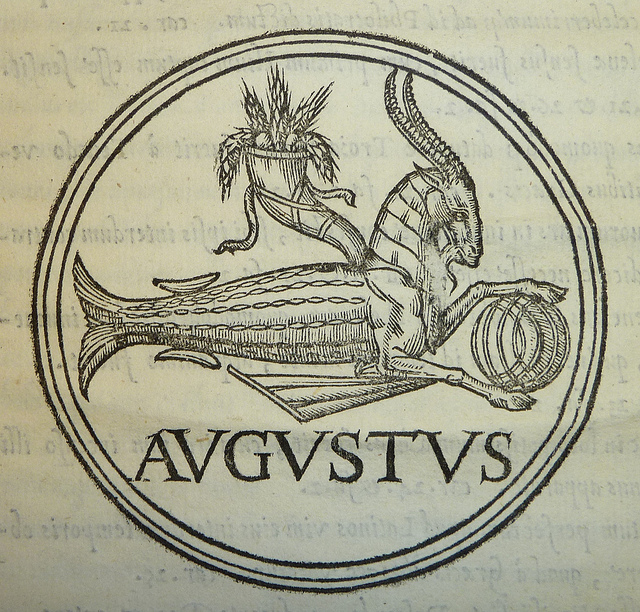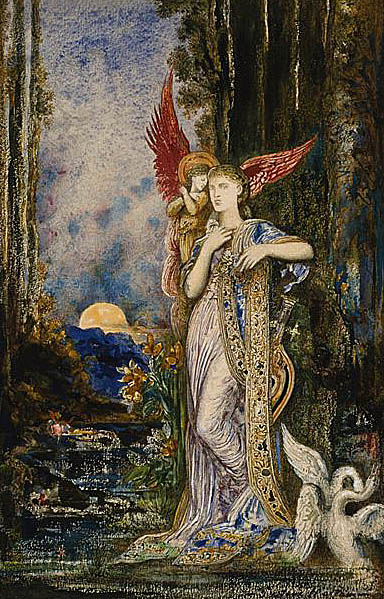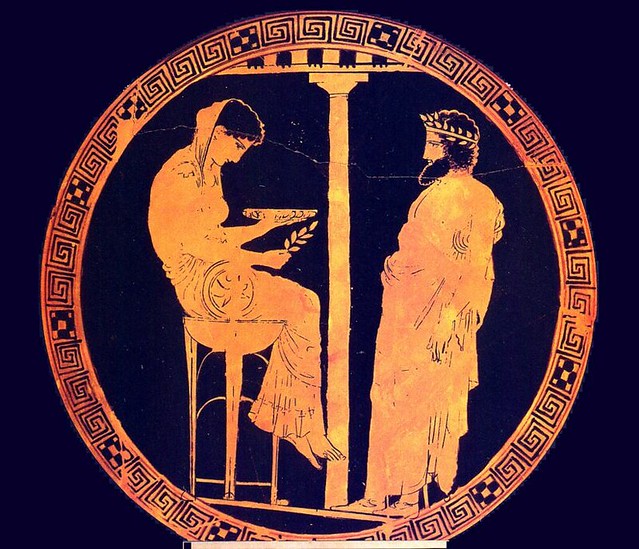“Sing in me, Muse, and through me tell the story…”
Homer, “The Odyssey”
Gustave Moreau, “l’Inspiration”
I am still making my way through a very beautifully written book by Darrin M. McMahon called Divine Fury: A History of Genius. Its chapter “The Genius of the Ancient“ is the subject of my musings today.
The Greeks had two words for “god”: theos, which referred to a specific god, and daimōn (a noun) or daimonion (a neuter adjective), which referred to an unspecified god or hero who intervenes in human life. Daimon was a mystical superhuman force (“the divine unknown,” as Gregory Nagy puts it) descending from on high and bestowing humans with supernatural gifts, making them daimoni īsos (equal with daimōn). Both Homer and Hesiod referenced daimōn in their work. While Homer did not make a distinction between gods and daimones, for Hesiod, daimones were originally heroes of the Golden Age, who died out and subsequently became watchers of mortals as their guardian spirits. Darrin M. McMahon mentions also that the followers of Pythagoras claimed that being able to see one’s daimōn was a clear indication of enlightenment. Socrates, the wisest of men according to the oracle of Delphi, claimed that an inner guiding voice had spoken to him ever since he was a child – but never told him what to do, but only what not to do.
Eugene Delacroix, “Socrates and His Daemon”
Both Homer and Hesiod emphasised that they owed their poetic inspiration (Latin inspirare – to breath into) to the Muses:
“Hesiod uses a different word, a variant of the Greek verb ‘pneo,’ to breathe, but his stress is on the same pneumatic source of poetic revelations, which are blown directly into the mind by the Muse. When we consider that poetry itself comes from the verb ‘poeien,’ to create, it follows clearly enough that poems are the creation of the gods, realized through their human artisans and agents.”
Darrin M. McMahon
Gustave Moreau, “Hesiod and the Muses”
Plato’s theory of divine possession demonstrated by poets exerted a tremendous influence on subsequent thinkers of all ages. He compared poets to soothsayers, prophets and seers and simultaneously deemed their power dangerous. Poets were to be banned from the ideal city of Plato’s Republic. McMahon offers an explanation of the paradox of Plato’s seeming fascination with beauty and art on the one hand and his ardor to ban poets on the other:
“Plato’s subtle critique of the poets, however, should not be read as animus toward poetry per se —his entire oeuvre resounds with a love of poetic language and skill—but rather as a frank acknowledgment of poetry’s seductive power. The divine gifts of language and imagination, he recognized, may easily be abused, above all in a political setting, where they can quickly inflame the passions and sway the soul. If the poet, in Plato’s celebrated description, was a ‘light, winged, holy thing,’ this same angelic being could prove a demon.”
In the twenty-first century, we know exactly what Plato prophesized when he talked about abusing words in a political setting. Of all seductive powers, words have always been the most dangerous.
What the Greeks called daimōn, bore the name genius in ancient Rome. The Latin word genius has an extremely enlightening etymology: it comes from the verb gigno, gignere, which means to generate, birth, beget. Related words in our modern language are for example gene and genitals. Says McMahon:
“…this much is clear: ‘genius’ from its earliest origins was power—an elemental ‘life force,’ in one classicist’s description, a ‘ubiquitous divine power penetrating the world of appearances,’ in the words of another. Genius was energy, a sacred presence akin to what the Romans called ‘numen,’ the aura of a god, or the ‘mana’ of animistic cultures, strange spirits and forces of nature. In the Roman case, however, the power of ‘genius’ seems always to have been linked to generation. And so there are indications, stretching all the way back to the time of the Etruscans in the eighth century BCE, of a connection between this propagating life force and the phallus, the Etruscans’ lord and giver of life. The Romans associated it in art with the horn of plenty and the snake, both symbols of reproductive capacity. The horn, with its undulating shaft, was as ubiquitous in early Italian religion, probably preceding even the founding of the Roman Republic at the end of the sixth century BCE, the snake appears to have served as a totem of ‘genius,’ a sacred creature that watched over the family and clan, embodying its reproductive power and guarding its lands.
…
Even more specifically, the power of the ‘genius’ gathered about the ‘lectus genialis,’ the marital bed, which served as a magical site of generation. It was here, at the point of procreation, where the clan and the family were conceived—where its ‘genes’ were passed from one ‘generation’ to the next—that the sacred power of ‘genius’ revealed itself and was fully disclosed.”
Etruscan mural: These (Theseus) threatened by a demon, Tomb of Orcus, Tarquinia
By an ingenious analogy, also the Greeks believed that people become daimoni īsos (like daimones) during the climax of a marriage ceremony. By merging with the Other, the ancients seem to have believed, we merge with divinity.
McMahon emphasizes that when the Romans spoke of genius they spoke only of male genius. However, he does not mention in his book that a female genius was called a juno. I think this is the greatest flaw in the whole book, which I am otherwise enjoying tremendously. We must realize that Roman women had a very limited form of citizenship. Bearing that in mind and in an act of modern feminist rebellion I hereby profess that all that was said about the Roman genius could and should be applied to both genders, notwithstanding what male Cives Romani would think of that usurpation.
For the Romans, the notion of genius was closely connected with that of the birth-star (astrum natale) and astrology. McMahon explains: “a genius was the god of our conception, honored on our birthday, the day on which the stars aligned in such a way as to assign our fate and form our character, giving us a ‘personality’ and particular traits.” Two words and two concepts: genius and ingenium (i.e. inborn nature) were very closely connected, almost merging into one.
There was one genius of the glorious Past that was worshipped by the (male) Romans above all others: Alexander the Great.
Gustave Moreau, “Triumph of Alexander the Great”
His mother was Olympias, a woman fascinated with snakes, who were often spotted crawling in her bed chamber. The reptilian connection to genius, “magical serpentine origins” in the words of McMahon, were also ascribed to Emperor Augustus: according to legends, a serpent shaped mark had also appeared on the body of his mother. Both Octavian Augustus and Alexander the Great possessed that ineffable quality that to this time we call charisma, and which derives from the Greek word kharis, meaning “divine favor or grace, a gift of the gods.” That numinous aura, the ancients believed, could be read from a natal chart of a person. In McMahon’s words:
“The historian Suetonius recounts how, as a young man, Octavian visited an astrologer with Agrippa, his close friend and ally, the future general of renown. When the astrologer predicted the commander’s brilliance, Octavian remained silent, withholding the details of his own birth for fear that he might be shown to possess a less exalted fate than his friend. But when he finally agreed to share them, the astrologer jumped up and venerated him, overcome by the brilliance of his destiny. ‘Soon,’ Suetonius writes, ‘Augustus had acquired such faith in fate that he made public his horoscope and had a silver coin struck with the image of the star sign Capricorn, under which he was born.’ Later, famously, when a comet appeared at games sponsored by Octavian in honor of the slain Julius Caesar, the young man interpreted the celestial disturbance as a sign that Caesar’s birth-star, his ‘genius,’ had returned to signal his favor, urging the adopted son to fulfill his father’s fate. Henceforth, he would claim the ‘sidus Iulium,’ the ‘Julian star,’ as his own.”

Capricorn’s one expression is that of patriarchal imperialism. Augustus’ s Sun was in fact Libra, a sign ruled by Venus, but he chose Capricorn (perhaps his rising sign) as his birth star for political reasons.
The ancient notion of genius/juno being a divine animating power, enchanting us into creative expression, stimulating our procreative urges is one I find very attractive. Thanks to our inner juno/genius we “do not walk alone in the universe,” McMahon concludes. Carl Jung spoke jokingly of the clown called “I” that frequently shuts out or strongly interferes with what our inner ingenious voice wants to tell us.
Sources:
Darrin M. McMahon, Divine Fury: A History of Genius
Gregory Nagy, The Ancient Greek Hero in 24 Hours
Related posts:

















So synchronous Monika as I am finishing a book on gifted adults, “geniuses”! Can you provide more details regarding your upset with women associated with Juno? I am interested in your opinions on this notion. BTW, may I live for awhile in these Moreaus? They could provide me with splendid sanctuary during the retrograde and eclipse season!
LikeLike
Dear Linda, we do need to brace ourselves this month, I think. Regarding your question – recently I have been feeling a lot of anger against patriarchy. Alongside the book on genius I have been reading Mysteries of the Dark Moon by Demetra George and The Chalice and the Blade by Riane Eisler. It seems the transition from matriarchy to patriarchy was far from peaceful, natural or organic but in fact was full of violence and injustice. There is a deep wound in the collective psyche of women, I think. Demetra tracked the way of the goddess by means of the lunar cycle and it seems that right now we are experiencing the new moon of the goddess cycle – she is reemerging from darkness, rejuvenated. I really hope we can learn from history and the new era that is being ushered will not be ushered in violence. I only hope for the right balance to be restored. It is about women claiming their power back but not about taking it away from men.
Hugs
Monika
LikeLiked by 1 person
Thank you for the clarification. I do not know how the transition occurred, but expected that it was ugly like the crusades, slavery, and all the rest that is documented. I am also glad you agree that it is about claiming power now and not enslaving the male( if that is even possible). In the US, there are few women leaders, but some are emerging with strength and compassion. Elizabeth Warren is one of them. I hope you will write more about what you have gleaned from your current reading.
Hugs back,
Linda
LikeLike
Monika, I too have sensed a growing awareness and energy around the reaction to patriarchy, and am actively seeking women writers and thinkers (through-out the ages). Thank you for your contributions in this regard! I find it no coincidence that our current patriarchal Western system of thinking, government legal systems etc is the same one based on Plato’s Greece that banished the poet and the “divine gifts of language and imagination”… along with women. I’m not saying women are more poetical, rather, that in valuing men over women, and logic and reason over imagination and passion, Plato created an artificial dichotomy that we still live to this day.
LikeLike
I am so happy that it is women who have decided to contribute to this post with their comments. This subject has been increasingly interesting to me. I think Plato was perhaps the least guilty – some called him the first feminist: http://humanstudy.org/history/2012-02-olivier-k.html
But you are so right that we need to revision the whole history and look at it with a different awareness now. I am making an effort to do so.
LikeLike
And agree, these paintings are amazing! I was not really familiar with Moreau, but am fascinated at how appears to be both classical and modern at the same time!
LikeLike
I always felt his name was overshadowed undeservingly by the more famous ones.
LikeLike
Dear Monika,
I am fascinated by this book. As a huge fan of these ideas of daimon as soul companion, I think you’ve found yet another important book on this topic.
I wonder too, if the genderization of Genius is indicative of the Roman culture and trends in culture and consciousness of the day.
Not defending them, but trying to build a timeline for how we moved from polytheistic and animistic consciousness to monotheism and the rise of power structures in western culture.
LikeLike
Dear Debra
If we adopted our modern sensitivities and looked at those Romans we would not be able to help calling them imperialists or mysogynist slave masters. But on the other hand I feel we cannot dismiss them like this. We do stand on their shoulders and we are not exactly blameless ourselves.
I am so loving that book on genius and I know you would, too. The next chapter is on Genius of Christianity.
Much love
Monika
LikeLike
Pingback: On Genius (2): Genius in Antiquity | lampmagician
I too appreciate the notion that inspiration / genius originate with the Divine.
Wonderful reading !!!!!!!!! 🙂
LikeLike
Nine exclamation marks!
Much obliged, dear Sir. :))
LikeLiked by 1 person
fascinating – theos and diamon – in Hindu terms could be Brahman and Avatar or in Buddhist terms the Buddha and Bodhisattva – God entering the human condition for its amelioration and salvation- ”a ‘ubiquitous divine power penetrating the world of appearances,’ in the words of another. Genius was energy, a sacred presence” – Brahman’s genius in the Avatar to save mankind – the Avatar Rama was born under Cancer – The configuration shows the Moon in Punarvasu ( an Asterism in the Zodiac sign Cancer), while the Sun is in the Sign Aries and the ‘birth’ takes place with the zodiac Sign Cancer rising above the horizon, becoming Rama’s ascendant Sign. All planets are so placed that they cast benign aspects on the ascendant Sign to herald the birth of the Almighty Spirit on the mortal plane as an Avatar.. –
”The ancient notion of genius/juno being a divine animating power, enchanting us into creative expression, stimulating our procreative urges” – indeed
amazing post
Indrajit
LikeLike
Shukriya, Indrajit.
It is truly fascinating to read about Lord Rama’s horoscope.
Thank you for an ingenious response to my writing.
LikeLike
Monika,
I was just reading some of “Swedenborg” by Gary Lachman, and thought of your writing and wanted to share this about Emmanuel Swedenborg, part of whose aim was “to produce a proof of the soul that the senses themselves would have to accept.”
“Swedenborg was aided in this quest by a psychological quirk that was linked to the breathing and concentration techniques I spoke of earlier. In his next major scientific work, the title of which is usually translated from the Latin somewhat awkwardly as “The Economy of the Animal Kingdom,” and which deals with the relation between the soul and the body, Swedenborg speaks of an inner experience that one suspects is, in different forms, common among people of genius. Speaking of those he considers the “true men of science,” Swedenborg tell us that:
‘they are exhilarated by the truth, and in the presence of everything that is clear they too are clear and serene. When, after a long course of reasoning, they make a discovery of the truth, straight-away there is a certain cheering light and joyful confirmatory brightness that plays around the sphere of their mind; and a kind of mysterious radiation- I know not whence it proceeds- that darts through some sacred temple in the brain.’
This ‘confirmatory brightness’ returned to Swedenborg whenever his mediations brought him closer to the truth. He referred to it as ‘the sign’ and it assumed for him the shape of a flame. It served for Swedenborg a similar paupers to that of the daimon that often counseled Socrates. But where Socrates daimon would voice a warning if he should avoid a certain course of action, the presence of Swedenborg’s flame was a sign that he was on the right track. Later, in his “Spiritual Diary” and in another work unpublished in his lifetime, “The Word Explained,” Swedenborg recognized that the flame and ‘cheering light’ were indications that he was being guided by spirits; now, however he took it as a symbol of inner approval.”
Beautiful writing Monika, thank you-
Gray
LikeLiked by 1 person
Beautiful. Beautiful. Beautiful.
Thank you, dear Gray.
LikeLike
So fascinating. I have Lachman’s book on Hermes Trismegistus. I love it for his ability to elucidate the most abstruse, complicated and esoteric content and bring it to the reader without oversimplifying it, too. Thanks so much for sharing, Gray.
LikeLike